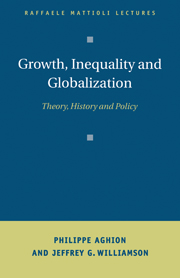Book contents
- Frontmatter
- Contents
- Preface
- Introduction
- Part I Inequality and economic growth
- Part II Globalization and the labor market: using history to inform policy
- 1 Globalization, labor markets and convergence in the past
- 2 Globalization and the causes of workers' living standard convergence in the past
- 3 Policy backlash: can the past inform the present?
- Author index
- Subject index
2 - Globalization and the causes of workers' living standard convergence in the past
Published online by Cambridge University Press: 04 November 2009
- Frontmatter
- Contents
- Preface
- Introduction
- Part I Inequality and economic growth
- Part II Globalization and the labor market: using history to inform policy
- 1 Globalization, labor markets and convergence in the past
- 2 Globalization and the causes of workers' living standard convergence in the past
- 3 Policy backlash: can the past inform the present?
- Author index
- Subject index
Summary
Why did wages and living standards converge?
The previous lecture established that wages and living standards in the Atlantic economy converged up to World War I. Convergence stopped thereafter, not starting again until 1950.
What caused the convergence, and why did it stop? Listing the possible causes is easy enough. The hard part is to identify which of them was most important. First, there is the possible impact of globalization in commodity markets: that is, the impact of trade itself when it surged in the six decades following mid century. Second, there is the possible impact of globalization in factor markets: that is, the impact of the mass migrations which reached a peak prior to World War I that never has been surpassed, and the impact of international capital flows which created a global capital market that was at least as well integrated as it is today. Third, there is the possible impact of technology transfer, the poor follower economies borrowing industrial, transport, and agricultural best-practice technologies from the rich leaders. Finally, there are all the closed economy forces which figure so prominently in the new growth theory: compared with the rich, the successful poor countries exhibit more rapid skill formation, more rapid capital accumulation, and more rapid total factor productivity advance, all of which might contribute to catching up, and none of which need be related to globalization.
What does history tell us? Did globalization cause wage and living standard convergence in the Atlantic economy prior to 1914, or instead was it closed economy, catch-up forces at work?
- Type
- Chapter
- Information
- Growth, Inequality, and GlobalizationTheory, History, and Policy, pp. 132 - 168Publisher: Cambridge University PressPrint publication year: 1999

